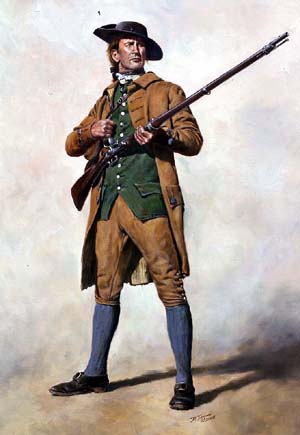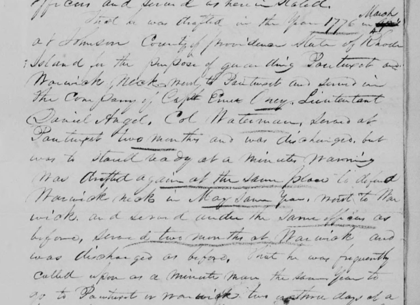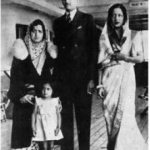
I have a confession to make: It’s all about the research. The hunt. Following the trail of clues. I know it sounds a bit Nancy Drew-ish, but isn’t the research one of the best parts of genealogy?
For example, the collaborative Mathewson Project that Midge Frazel and I are investigating involves a lot of research before we can begin to synthesize it all into our working hypothesis. We are following “cold cases” and doing as much online research as possible before taking to the field. A lot of our searches come up empty, but for me at least, more than a few searches are turning out pretty darn interesting. . .
I had no idea last week that my top task would lead me right into the duties of a Revolutionary War Minute Man, but that is exactly where I ended up yesterday, Memorial Day.
In following the lives of Noah Mathewson’s children I turned to the series of Revolutionary War Pension Applications available on Footnote.com, but those New England given names reccur so often that it’s hard to make out who’s who and how they are all related. I started to read all the Mathewson pension files, just to see if any names or dates popped out.

Before long, I found it didn’t really matter that William Mathewson is not one of Noah’s sons, I was fascinated by the story of how he was drafted to serve in the Rhode Island Troops and how he spent the days of his service. In just a few sentences, I learned the origin of the term “Minute Man” and the duties of such service.
. . . That he was drafted in the Year 1776 in March at Johnson County of Providence State of Rhode Island for the purpose of guarding Pawtucket and Warwick Neck. went to Pawtucket and served in the company of Capt. Emet Oney, Lieutentant Daniel Angel, Col. Waterman, served at Pawtucket two months and was discharged, but was to stand ready at a minutes warning, was drafted again at the same place to defend Warwick neck in May same year. Went to Warwick and served under the same officers as before, served two months at Warwick and was discharged as before. That he was frequently called upon as a minute man the same year to go to Pawtucket ad Warwick two or three days at a time the same year. . .
William Matthewson, and later his wife Tabitha, had to provide testimony and witnesses in support of William’s claim to service. “By reason of old age and the consequent loss of memory he cannot swear positively as to the precise length of his service,” wrote the county Justice of the Peace who took his statement 30 January 1833. A shaky “X” records William’s mark; he was then about 88 years of age.
It appears that William was eventually awarded a pension for his service as a Minute Man, standing ready at a minute’s warning to guard the state’s borders from attack.
Source:
“Revolutionary War Pension and Bounty-Land Warrant Application Files, 1775-ca 1900,” digital images, Footnote.com (www.footnote.com: accessed 29 May 2011); entry W. 16,338 for William Matthewson (Rhode Island Troops) and widow, Tabitha; imaged from Case Files of Pension and Bounty-Land Warrant Applications Based on Revolutionary War Service, compiled ca. 1800 – ca. 1912, documenting the period ca. 1775 – ca. 1900, (Washington, D.C.: National Archives [n.d.]), M804.






I totally agree with the hunt being the most fun, frustrating at times but definitely the exciting part.
Thanks for both of these posts.
We just watched a season 1 episode of "The Generations Project" on BYUtv. It had a young man 'get' into genealogy after he did this episode. Previously he thought genealogy was for 'old' people looking for those that 'passed' before them because they were getting ready to 'pass' themselves! So many preconceived notions….JLK